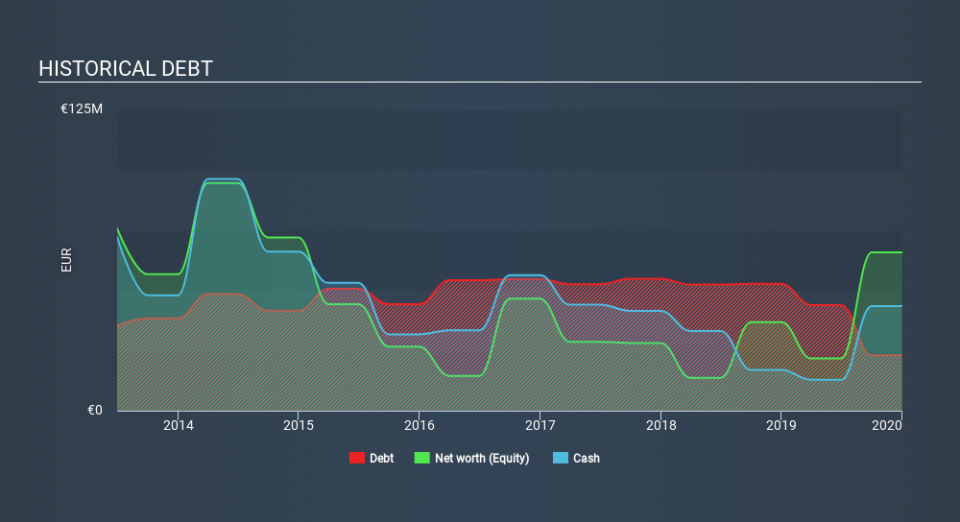Is Transgene (EPA:TNG) Using Debt In A Risky Way?

David Iben put it well when he said, 'Volatility is not a risk we care about. What we care about is avoiding the permanent loss of capital. So it seems the smart money knows that debt - which is usually involved in bankruptcies - is a very important factor, when you assess how risky a company is. As with many other companies Transgene SA (EPA:TNG) makes use of debt. But the real question is whether this debt is making the company risky.
What Risk Does Debt Bring?
Debt assists a business until the business has trouble paying it off, either with new capital or with free cash flow. In the worst case scenario, a company can go bankrupt if it cannot pay its creditors. While that is not too common, we often do see indebted companies permanently diluting shareholders because lenders force them to raise capital at a distressed price. By replacing dilution, though, debt can be an extremely good tool for businesses that need capital to invest in growth at high rates of return. The first thing to do when considering how much debt a business uses is to look at its cash and debt together.
View our latest analysis for Transgene
What Is Transgene's Debt?
You can click the graphic below for the historical numbers, but it shows that Transgene had €23.0m of debt in December 2019, down from €52.7m, one year before. However, its balance sheet shows it holds €43.4m in cash, so it actually has €20.4m net cash.
A Look At Transgene's Liabilities
We can see from the most recent balance sheet that Transgene had liabilities of €18.6m falling due within a year, and liabilities of €31.1m due beyond that. Offsetting this, it had €43.4m in cash and €3.81m in receivables that were due within 12 months. So its liabilities outweigh the sum of its cash and (near-term) receivables by €2.60m.
Of course, Transgene has a market capitalization of €108.3m, so these liabilities are probably manageable. However, we do think it is worth keeping an eye on its balance sheet strength, as it may change over time. Despite its noteworthy liabilities, Transgene boasts net cash, so it's fair to say it does not have a heavy debt load! There's no doubt that we learn most about debt from the balance sheet. But ultimately the future profitability of the business will decide if Transgene can strengthen its balance sheet over time. So if you're focused on the future you can check out this free report showing analyst profit forecasts.
Over 12 months, Transgene reported revenue of €13m, which is a gain of 88%, although it did not report any earnings before interest and tax. With any luck the company will be able to grow its way to profitability.
So How Risky Is Transgene?
Statistically speaking companies that lose money are riskier than those that make money. And we do note that Transgene had negative earnings before interest and tax (EBIT), over the last year. And over the same period it saw negative free cash outflow of €24m and booked a €19m accounting loss. However, it has net cash of €20.4m, so it has a bit of time before it will need more capital. With very solid revenue growth in the last year, Transgene may be on a path to profitability. Pre-profit companies are often risky, but they can also offer great rewards. When analysing debt levels, the balance sheet is the obvious place to start. However, not all investment risk resides within the balance sheet - far from it. Case in point: We've spotted 4 warning signs for Transgene you should be aware of, and 1 of them is potentially serious.
Of course, if you're the type of investor who prefers buying stocks without the burden of debt, then don't hesitate to discover our exclusive list of net cash growth stocks, today.
If you spot an error that warrants correction, please contact the editor at editorial-team@simplywallst.com. This article by Simply Wall St is general in nature. It does not constitute a recommendation to buy or sell any stock, and does not take account of your objectives, or your financial situation. Simply Wall St has no position in the stocks mentioned.
We aim to bring you long-term focused research analysis driven by fundamental data. Note that our analysis may not factor in the latest price-sensitive company announcements or qualitative material. Thank you for reading.

 Yahoo Finance
Yahoo Finance 
